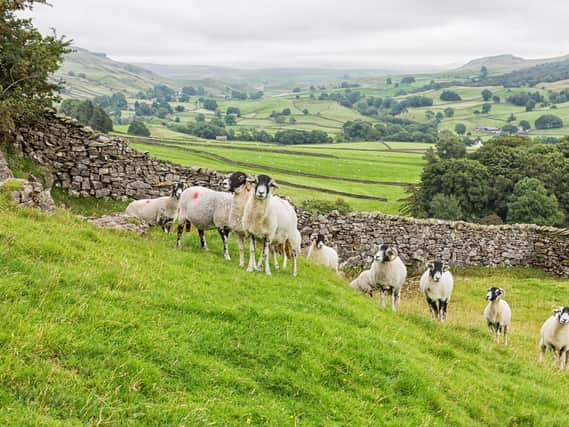Sheep farmers could profit more from returning their land to native trees and selling carbon 'credits' new report claims


The research, carried out by the University of Sheffield, suggests most sheep farming in the UK is not profitable without subsidies if farmers are paid for their labour.
But, it said, farmers could make money by allowing native trees to return to their land and selling ‘credits’ for the amount of carbon dioxide the trees absorb as part of efforts to tackle climate change.
Advertisement
Hide AdAdvertisement
Hide AdThe study comes as the Government shifts the post-Brexit farming payments scheme away from subsidies for the amount of land farmed to paying for ‘public goods’ such as storing carbon and stopping flooding.
The university’s Grantham Centre for Sustainable Futures said livestock farming was both “heavily dependent” on subsidies and generated greenhouse gas emissions, with sheep farming accounting for around one per cent of the UK’s total climate pollution.
But, the study said, the UK, with tree cover of eight per cent, making it one of the least densely forested countries in Europe, has a large potential for restoring and creating woodlands to help soak up carbon emissions.
It found that farmers with at least 25 hectares of land (60 acres) could turn a profit if they allowed it to naturally regenerate into woodland and were paid as little as £3 a tonne for the carbon the woods store.
Advertisement
Hide AdAdvertisement
Hide AdAnd went on to suggest the credits could be bought by businesses or individuals who want to offset their emissions, for example from flights.
If they were sold for £15 a tonne – the current market price for carbon credits – they could make forests of any size profitable, the study published in the journal Environmental Research Letters said.
Natural regeneration would work in areas close to existing woodland which would provide seeds for the land. If farmers had to plant trees, they would need a price of around £42 per tonne of carbon stored – although government grants in England can cover 80 per cent of costs, which makes planting profitable from £9 a tonne, the study said.
As well as cutting carbon emissions, switching from sheep farming to native forests could boost wildlife and curb flooding, the research said.
Advertisement
Hide AdAdvertisement
Hide AdIt adds that it “would make sense economically and environmentally” to use the post-Brexit Environment Land Management Scheme (ELMS) to pay farmers to return their land to forests.
The researchers also questioned whether it is right to pay farmers to preserve non-natural pastoral landscapes in the UK, preventing reforestation, while putting pressure on developing countries to curb tropical deforestation.
Professor Colin Osborne, from the University of Sheffield and lead author of the study, said: “Sheep farming in the UK is not profitable without subsidies, but forests that sell carbon credits can be economically viable – so it makes sense for the Government to help farmers transition.
“Ultimately, these come down to political questions of how we want our countryside to be used, how we value livestock production over the global costs of climate breakdown, and how the Government supports farmers and rural communities.”
Comment Guidelines
National World encourages reader discussion on our stories. User feedback, insights and back-and-forth exchanges add a rich layer of context to reporting. Please review our Community Guidelines before commenting.